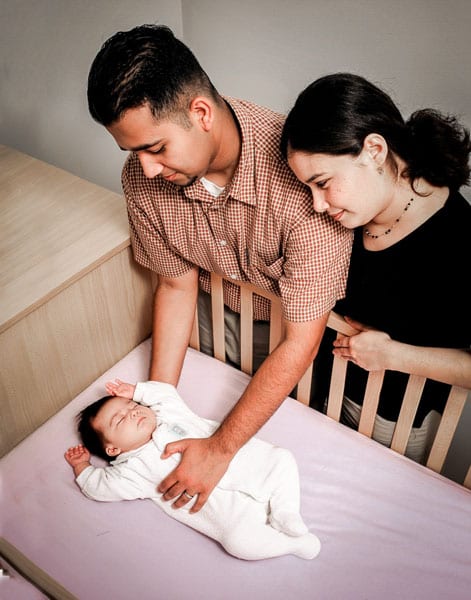Keeping Baby Safe from the Start
Immediately after birth, there are a few important things that can keep baby safe and healthy.
Babies are recommended to be placed on their mom’s chest, skin to skin, when they’re born, if all is well. This practice soothes your baby and helps with breastfeeding and bonding. Holding baby skin-to-skin can be a normal part of how you care for your baby beyond your hospital stay. Most hospitals provide the opportunity for you to “room-in” with your baby until you go home. Your baby will stay with you all the time rather than going to a nursery, which promotes baby being able to feed as needed, benefitting both of you. If you’re breastfeeding, your milk comes in sooner the more your baby is at the breast.
ALSO READ: The Importance Of Skin To Skin and Here’s Why Skin-to-Skin is So Essential
There are a few cautions about placing baby in bed with you, skin to skin. Many women are tired, maybe exhausted, after labor and birth. No one wants to think about falling asleep while breastfeeding in bed and dropping their baby or rolling against the baby so baby can’t breathe (accidental suffocation). Newborn babies are not able to move themselves out of a dangerous position. Although rare, falls and accidental suffocation are real risks. The good news is that almost all accidents are preventable by taking a common-sense approach.
Take steps to stay safe and make sure you don’t fall asleep while breastfeeding, whether you’re in bed or lying on a couch or other soft surface. You could set an alarm on your phone or ask your companions to wake you if you begin to fall asleep. Make sure you can see baby’s face while holding her, whether she’s feeding or sleeping. How your baby’s positioned is important. For many years it’s been known that babies are safest when placed on their backs to sleep, not on their sides or tummies
ALSO READ: 15 Safe Sleep Tips for Baby
Research shows that the majority of newborn falls occur at night when mom is holding baby in her arms and falls asleep. Her body relaxes, and baby slips out of her arms to the floor. Falls can also occur when another family member is holding baby while sitting on a couch or chair and drifts off to sleep. Make sure baby is never left alone on a bed or couch while at the hospital or at home. If baby is not being held by a fully awake adult, she should be placed back into the bassinet or crib.
While most moms are fully able to care for their newborn, there are times this may not be the case—and you may need extra help! And you’re the best person to know if you need more support. In the hospital, your nurse will assess your need for help but there may be details the nurses won’t know about you, your family situation, and background. Infant safety starts the moment your baby is born and being aware of what can go wrong is a huge first step to prevent accidents.
Do not be afraid to ask for help, especially in these situations
- You’ve had a cesarean birth—remember this is major surgery
- You’re taking narcotic pain or other sedating medications
- You have birth complications such as postpartum hemorrhage or preeclampsia
- You do not have family members who can stay with you at the hospital and when you first go home
- You are exhausted or feel overwhelmed by having undergone a powerful, and life changing, event—giving birth
Asking for extra help in the hospital: A grandmother’s story
My first grandson was born at 5 in the morning. By the time he finally arrived, my daughter had had very little sleep for the previous 48 hours. Her birth was considered completely normal, but she was also completely exhausted. Then, breastfeeding was not going well, and the baby was losing weight. My daughter was tense and slept very little the next night, and baby lost more weight. By day three, the stress level was extremely high. Thankfully, in this hospital they had a staffed nursery at night, but it was not readily offered, and we had to ask them to take the baby so my daughter could get the rest she needed.
See also: Why Is Your Baby Hungry All The Time?
My Baby Cries Every Night
Recognizing When Your Baby Has Gas
Sharon C. Hitchcock is a clinical assistant professor at the University of Arizona College of Nursing and an expert nurse adviser to Health Mom&Baby. Melanie Welch is a clinical instructor at the University of Arizona College of Nursing and childbirth educator at St. Joseph’s hospital in Tucson, Arizona.






Comments are closed.